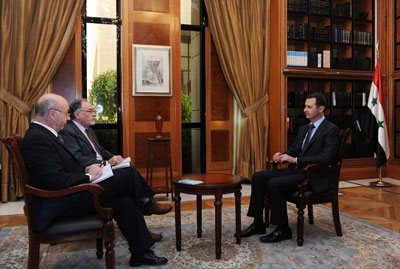H.E. President Bashar Al-Assad reiterated that the basis for any political solution for the crisis in Syria is but what the Syrian People want through ballot boxes.
In an exclusive interview with Argentina’s Clarin Newspaper and Telam News Agency, President Al-Assad underlined readiness to hold dialogue with every anti-terrorism Syrian side which didn’t deal with Israel.
Syria, according to President Al-Assad’s statements, has pursued a “policy of wide scale reforms from changing the constitution to many of the legislations and laws, including lifting the state of emergency law, and embarking on a national dialogue with all political opposition groups. However, the more of reform measures taken, the more of escalation in terrorism occurred. Indeed terrorism has nothing to do with reforms and should in way be used as instrument for reforms.
Syria is indeed “committed to political reforms and have implemented them, and presented a broad political initiative based on a national dialogue” on the bases of the “aspirations of the Syrian people, decided by the ballot boxes”. It is the Syrian-Syrian concept of rational dialogue with all spectra of political parties and bodies and genuine national opposition. Actually, Syria has sought the “national dialogue with all political entities, which would then act as a pre-requisite for a unified national charter and a new constitution with a wider range of freedoms, including political and media freedom.
“We reiterate our support for all steps that would entail stopping the violence in Syria and lead to a political solution. However, the cessation of violence is paramount to reaching a political settlement,” said H.E. President Al-Assad, who was the first since the onset of the crisis to call for dialogue among the Syrians as to sort the crisis out. Unfortunately, many Arab, regional and western countries pushed their noses in the crisis and continued to funnel, train, and arm al-Qaeda affiliates in Syria.
“We do remain skeptical of the genuine intentions of certain western administrations towards seeking a realistic political solution in Syria. This caution is based on their continued support of terrorist groups in Syria. We are dedicated to pursuing a political solution, yet there are powers who are pressing for the failure of such a solution. This is a two-way process; it needs commitment from all sides.” President Al-Assad underscored, citing the presence of opposition segments which survive on the aid given to them by their patron states, in essence manipulated by the nations that provide their flow of finance.
Such segments of opposition outside the borders of Syria do “live under the auspice and control of their intelligence agencies and thus submit to what is imposed upon them. Therefore their decisions are not self-governing; most significantly, they lack a popular base in Syria. If they believed that they had public support, they would have functioned politically from within Syria’s borders, not extrinsically from abroad,” questioning the justification for the presence of parts of the opposition abroad, except for the notion that they are led by external agendas.
Indeed the majority of the Syrians are “skeptical” about both these opposition groups and the countries supporting them. This opposition is completely subjugated to such countries, especially Qatar, Saudi Arabia and Turkey, which sponsor and fuel terrorism in Syria and this is the very opposition, which rejects the dialogue.
President Al-Assad reasserted that “we have always advocated and remain vehemently committed to a comprehensive national dialogue to include all who have a genuine desire to participate, with no exclusions. We would engage in dialogue with all political entities, internal or external with no set pre-conditions. This also includes the armed groups who lay down their weapons and renounce terrorism. Guns and dialogue are clearly incompatible.”
Dr. Mohammad Abdo Al-Ibrahim

